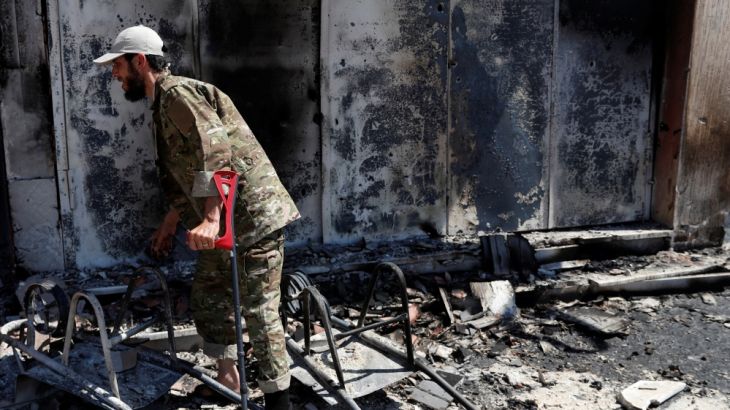US politicians ask Pompeo to clarify policy on Libya
Bipartisan legislators say Libyan armed groups are using confusion over US policy to justify fighting in Tripoli.

A group of US politicians has asked President Donald Trump‘s administration to clarify its policy on Libya, saying armed groups in the North African country were using confusion over the White House’s stance to justify engaging in conflict.
In a letter to US Secretary of State Mike Pompeo on Friday, eight members of the House of Representatives urged the White House to “clearly” reject a military offensive launched by renegade Libyan commander Khalifa Haftar to seize the capital, Tripoli, from the country’s internationally recognised government.
Keep reading
list of 4 itemsCIA chief visits Libya after Lockerbie suspect handover
Libya: Violence to Votes
In Libya, anger and uncertainty after polls delayed
Haftar, who is allied to a rival administration in the country’s east and is backed by US allies including the United Arab Emirates and Egypt, began the offensive on April 4, vowing to “cleanse” the capital of “terrorist groups”.
The US initially demanded an “immediate” halt to Haftar’s offensive, with Pompeo issuing a statement on April 7 opposing Haftar’s offensive.
But in late April, the White House issued another statement saying Trump and Haftar had spoken over the phone on April 15. During that call, Trump recognised Haftar’s “significant role in fighting terrorism and securing Libya’s oil resources,” the statement read.
In their Friday letter, the members of the House Committee on Foreign Affairs said the “generic read-out” of Trump’s call with Haftar “has led to perceived uncertainty regarding the US position”.
Today @HouseForeign members wrote to @SecPompeo regarding the conflict in #Libya. Libyan armed actors are using confusion over US policy to continue conflict, jeopardizing political settlement & threatening regional stability. We need answers.
📰 Release: https://t.co/6Gc6xvYosv pic.twitter.com/ONefNwxL4t
— Rep. Ted Lieu (@RepTedLieu) June 7, 2019
“Libyan armed actors are now using that confusion over US policy as justification to continue the conflict, further jeopardising prospects for a political settlement and threatening regional stability,” said the bipartisan group, which included six Democrats and two Republicans.
‘Security vacuum’
The fighting near Tripoli has killed nearly 600 people, wounded nearly 3,000 others and forced more than 80,000 people to flee their homes. Haftar’s forces have meanwhile become bogged down in the southern outskirts of the city.
The US politicians said the “protracted conflict” was recreating the same “security vacuum” which the Islamic State of Iraq and the Levant (ISIL or ISIS) exploited in 2014 when it established in Libya its most powerful affiliate outside of Syria and Iraq.
|
|
Noting ISIL has claimed six attacks since the battle for Tripoli began, the legislators said: “The best way to prevent further terrorist attacks is to reach a ceasefire and return to a political process.”
The letter added: “We therefore request that you publicly clarify that the US opposes a military solution in Libya and that the US condemns all actors undermining stability and perpetuating violence.”
Al Jazeera’s Patty Culhane, reporting from Washington, DC, said the US politicians were trying to attract media attention to the Libyan conflict.
“What these Congressmen and women are trying to do is make this an issue that gets covered because this is an administration that tends to react to what they read and see in the media. And right now, the conflict in Libya is really not being covered at all.”
Meanwhile, a senior official with the Tripoli-based Government of National Accord (GNA) claimed on Friday that the US was “standing by us as the legitimate government of Libya”.
Deputy Prime Minister Ahmed Maetig made the remark in Washington, DC, after talks with US legislators and officials at the State Department. He also said the GNA requested that the US use its influence to end its regional allies’ support for Haftar.
Following Maetig’s talks with Congresspeople and the State Department in Washington on Friday, the US State Department was careful in its comments on the visit.
Speaking to the AFP news agency on the condition of anonymity, an official said Washington wanted the GNA and Haftar to resume talks and seek a political solution.
In separate reports in late April, Bloomberg and the Guardian said the change in US policy followed a meeting between Trump and Egypt’s President Abdel Fattah el-Sisi and a phone conversation with the UAE’s Crown Prince Mohamed bin Zayed
Both leaders urged Trump to back Haftar, the reports said.
Libya has been wracked by chaos since the 2011 NATO-backed overthrow of the country’s longtime ruler, Muammar Gaddafi.